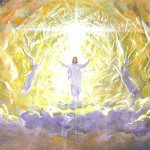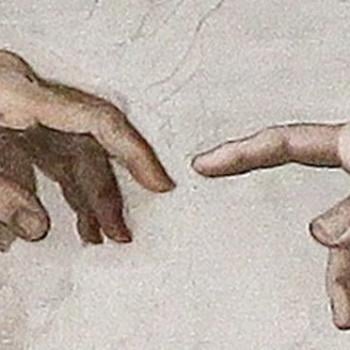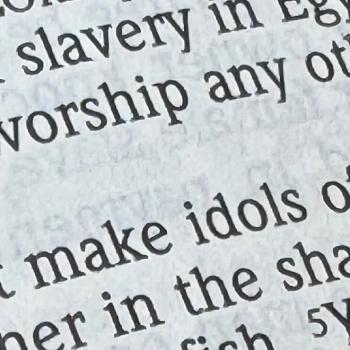Noah, the movie, is such a messy mish-mash of conflicting memes that I’m not really sure how to characterize it.
It is set in a post-apocalyptic world in which a king, who bears the name Tubal Cain, has supposedly destroyed creation by eating meat and forging weapons of iron. The Biblical Tubal Cain was a descendent of Cain, and he did forge various instruments of bronze and iron, so I’m guessing that’s where the filmmakers got that idea.
The human race has descended to cannibalism and is so obviously on its way out that one wonders why God would bother annihilating it.
Noah and his family, along with the rest of humanity, live in a barren waste that looks like a lava field. There is no vegetation to speak of in this post-apocalyptic world; nothing to sustain the life of even one person, much less a whole “industrial civilization,” which is what the film claims exists.
The narrative arc of the movie is primarily the tale of Noah’s rise and fall in obedience to “the creator.” Noah rises to obedience to “the creator” by building an ark to save the animals, the “innocents” as the movie calls them, from the destruction of the Flood.
“The creator” has ordained that all people should perish, including Noah’s family, which is made inevitable, since Noah and his wife have only sons and the sons have no wives. Noah falls from obedience because he refuses to kill his own granddaughters in order to “end” the human race.
This is a massive departure from both the facts and the meaning of the story of Noah in Scripture. The first human beings with whom God made a covenant were Adam and Eve when He gave them dominion over creation and told them to “be fruitful and multiply.” They deformed this Covenant when they decided to disobey God.
Noah was the second person with whom the Almighty formed a Covenant. God spoke to Noah and gave him specific instructions on what he was to do. He also renewed the Covenant He had made with Adam and Eve with Noah, giving him and his progeny (unlike in the movie, Noah’s sons had wives) dominion over creation and telling them to be fruitful and multiply.
The entire narrative arc of the movie, which is built around the idea that it was God’s will that humanity be obliterated entirely, is anti-Biblical.
There is a brief mention in the movie of the real reason for the Flood, which is that fallen angels had mated with human women and the resulting offspring were such a taint in the human blood line that the line had to end and begin again. The movie is accurate in that the violence of humanity was also given as a reason. The entire line of Cain was wiped from the earth with the Flood.
Rather than connecting the dots about what the Nephilim were, the movie supplies us with Animators in the guise of fallen angels. The angels supposedly fell from grace when they disobeyed “the creator” and tried to help humanity. Their punishment was to become klutzy creatures, encapsulated in rock.
The animator/fallen-angels help Noah build the arc, and end up defending it Mad Max style against an invasion by Tubal-Cain’s hordes just as the rains begin. Their reward for this is that they are forgiven, shed their rock covering and warp off to the skies.
There is nothing in the movie of the grand theme of Noah, the renewer of the Covenant with humanity. The Bible story is edited significantly to provide us with the human-beings-are-bad/animals-are-the-innocents/humanity-must-die arc that the movie version of Noah’s story is woven around.
Noah’s movie encounters with God are limited to dreams. Instead of the precise instructions that the Almighty gave Noah in the Scriptures, we are treated to a Quest in which Noah goes to visit his grandfather Methuselah who acts as shaman and wizard. Methuselah lives in a cave with no food or visible means to provide food, and no contact with other humans.
He gives Noah a potion to drink which makes “the creator’s” plan a bit more clear to him. Later in the film, Methuselah heals Noah’s adoptive daughter with a touch, thus enabling her to bear the children which lead to Noah’s downfall. Methuselah does this at the behest of Noah’s wife, who, in a repeat of the Eve story, is the instrument which leads to Noah’s failure to obey “the creator.”
Instead of renewing the original Covenant with Adam and Eve, which is what the Bible story is about, Noah ends up renewing the Fall.
The Biblical story ends with humanity beginning again with God’s blessing. The movie ends on a hopeless note of fallen humanity separated from God forever. The only creatures who gain redemption are — get ready for this — the fallen angels.
Frankly, I think the movie makers are trying to get some of those $$$ that people of faith control. But they can’t bring themselves to make a movie that actually deals with the message that resonates throughout Scripture.
We are made in God’s image. We are fallen. We do have dominion over all creation. That is why we can tease out things like the Big Bang and unravel the secrets of how God did it when He made everything, everywhere. Although we are made of the dust of this earth and are bone and flesh, we are, in this essential quality, not the least bit like the animals. We can do great goodness. We can also commit great sin.
The Scriptures are the story of Jesus. Noah and the Covenant God made with him is the beginning of God’s active interaction with a fallen and depraved humanity. Over long millennia of slow interaction, God will raise up a people, who, after many falls and much chastisement, will give humanity its Christ, the final and absolute un-doer of the curse of the Fall.
I don’t expect a movie about Noah to tell this whole story. But I do expect it to be faithful enough to the Biblical narrative that I can, by watching it, place that story within the narrative whole of the Scriptures. This movie goes the other direction in order to deliver a message that is not only not part of the Biblical narrative, but in most ways, it runs counter to it.
Human dominion over creation becomes sinful when it becomes exploitation and destruction. We, alone of all the beings on this planet, have the capacity to chose, and our call in relation to creation is to chose to be responsible in how we use it.
This strikes to the heart of our politics, commerce and endless warfare. It shows us our sins in a glaring way that many people deny.
But the PETA-esq meme of this movie denies the essential fact of humanity as it relates to the created universe. We have dominion; it was created for us.












